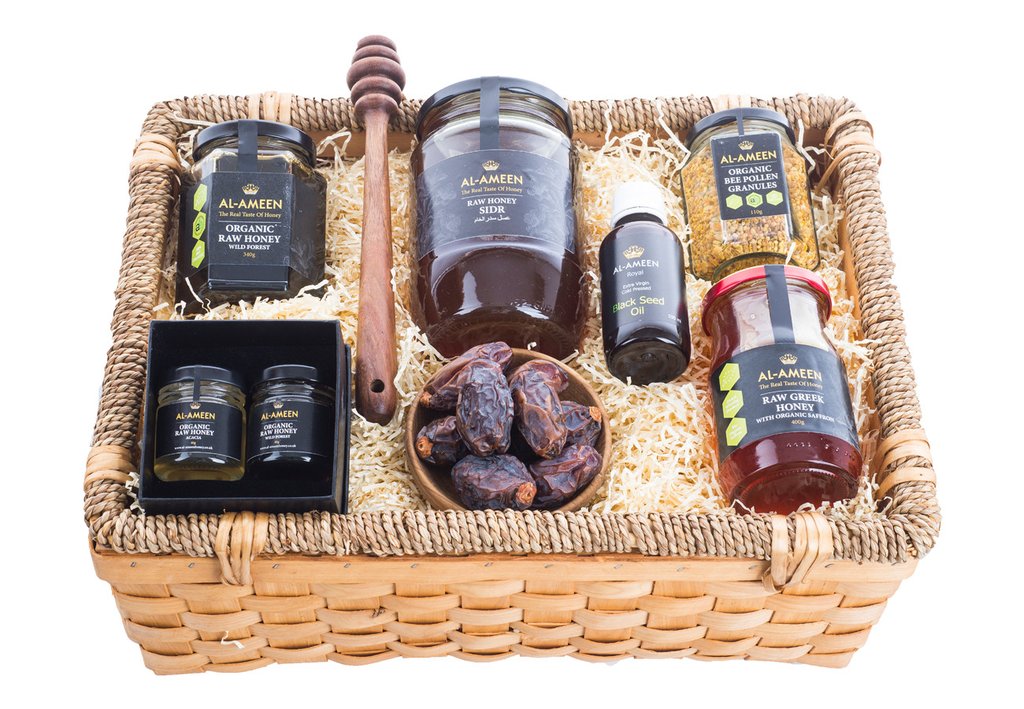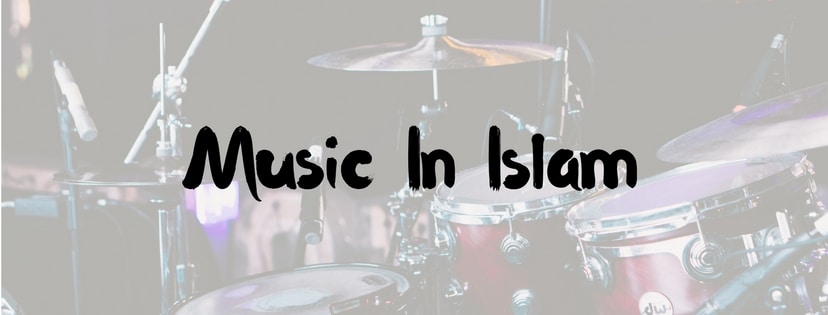Buying a gift is never easy. Finding Sunnah gifts is even more difficult.
That’s why we’ve put together a list of the five top Sunnah gifts for your Muslim friends and family.
What are ‘Sunnah Gifts’? We are talking about Islamic/Muslim gifting items used by the prophet Muhammed (PBUH), or recommended by him.
Let’s go through each sunnah gift item calling out references to Quran, Hadith and Science.
Sunnah Gifts
5. Honey

Certified Organic and Raw Polyflora Honey on Amazon
Did you know Honey is a cure for every disease except death?
There are various Hadith and Quranic verses highlighting the benefit of Honey. Not only is it mentioned in religious text but Science also backs the claim that Honey contains various healing properties for our health.
Honey can be purchased from your supermarket shelves, but more organic forms can be presented as gifts. There are so many to choose from. Check out the honey gift selection on Amazon – it makes the perfect sunnah gift.
Honey in Quran
“And thy Lord has inspired the bee, saying, ‘Make thou houses in the hills and in the trees and in the trellises which they build. Then eat of every kind of fruit, and follow the ways of thy Lord that have been made easy for thee.’ There comes forth from their bellies a drink of varying hues. Therein is cure for men. Surely, in that is a Sign for a people who reflect.”
(Quran 16:69-70)
The Quran clearly states there is a cure within Honey, making it a perfect sunnah gift. This verse also calls out the varying nature of Honey, it comes in different colours and can be processed in many ways.
In Fact, according to ‘The Spruce Eats’, there are several flavor profiles that you can expect from different types of honey.
Flavour Profiles of Honey
Acacia is very sweet with a clean, pure, classic honey flavor.
Alfalfa is light honey with a nice mild spicy note and floral aroma.
Blackberry honey is deep and rich while still being fruity.
Blueberry honey has a slight tang and a fruity flavor.
Buckwheat is tasty on toast. Its strong and spicy flavor makes it perfect for marinades.
Clover is classic honey that’s light, sweet, and floral.
Coffee honey tends to be quite dark, with a rich, deep flavor that matches its color.
Eucalyptus honey has just a hint of menthol flavor in it, making it perfect for stirring into tea.
Fireweed honey has a markedly complex flavor and a slightly buttery texture. Like buckwheat honey, it can stand up to meats, marinades, glazes, and grilling.
Heather is pungent and almost bitter, in a good way. It’s great with smoky things, or on wholesome baked goods.
Macadamia nut honey has a distinctive sweet and nutty flavor with a lovely floral scent.
Palmetto is mild honey with balanced sweetness.
Sourwood is caramel-like and buttery and delicious on toast, biscuits, muffins, and any other food item you can think of.
Wildflower honey is light and fruity yet richly flavored at the same time.
Even your most fussy friend is bound to enjoy at least one of these flavours.
Honey in the Bible
Allah did not wait until the final revelation in order to reveal the benefits of honey. The older religious books have also mentioned honey as being a benefit for mankind.
Prophet Solomon is reported to have said:
“My son, eat thou honey, because it is good; and the honeycomb, which is sweet to thy taste. So shall the knowledge of wisdom be unto thy soul: when thou hast found it, then there shall be a reward, and thy expectation shall not be cut off.”
(Old Testament, Proverbs 24:13-14)
Many Jews beleive in the benefits of Honey as a result of this verse.
Prophet Jesus & his disciples are reported to have eaten fish with honey comb:
“While they were still in disbelief because of their joy and amazement, He asked them, ‘Do you have anything here to eat?’ So they gave Him a piece of broiled fish and some honey comb, and He took it and ate it in front of them.
(Luke 24:42)
Hadiths on Honey
There are several hadiths related to Honey. They help us understand Honey as being a favourite food of the prophet, and further elaborate on the benefits of Honey. Let’s take a look at key hadiths on Honey.
The Prophet liked honey
Aisha reported: The Messenger of Allah, peace and blessings be upon him, used to like sweets and honey.
Source: Ṣaḥīḥ al-Bukhārī 5115
Honey is compared to the water of Jannah
Thawban reported: The Prophet, peace and blessings be upon him, said, “My fountain is from Eden to ‘Amman al-Balqa’. Its water is whiter than milk and sweeter than honey. Its cups are as numerous as the stars. Whoever drinks from it will never be thirsty afterwards forever. The first people to arrive at it will be the poor emigrants, their hair disheveled and their clothes stained, who are not favored in marriage and for whom the gates of rulers are not opened.”
Source: Sunan al-Tirmidhī 2444
Honey can rest the heart
Barley, Milk and Honey make up Talbina.
Aisha reported: The Messenger of Allah, peace and blessings be upon him, said, “Verily, talbina rests the heart of a sick person and takes away some grief.”
Source: Ṣaḥīḥ al-Bukhārī 5365
Honey contains healing properties
Ibn Abbas reported: The Prophet, peace and blessings be upon him, said, “There is healing in three: a cupping operation, a drink of honey, and cauterization with fire, but I forbid my nation from using cauterization.”
Source: Ṣaḥīḥ al-Bukhārī 5357
Wait… what’s cauterization?
If you’re intrigued by the phrase ‘cauterization with fire’ you’re not alone. Although there is healing benefit in this practice, it’s not always a safe proceduce – especially back in the days. Therefore the Prophet forbade it.
Cauterization is a medical practice of burning part of a body to remove or close off a part of it. It destroys some tissue in an attempt to mitigate bleeding and damage, remove an undesired growth, or minimize other potential medical harm, such as infections when antibiotics are unavailable
https://en.wikipedia.org/wiki/Cauterization
Honey can help with Diarrhea
Abu Sa’id al-Khudri reported: A man came to the Prophet, peace and blessings be upon him, and he said, “My brother has diarrhea.” The Prophet said, “Give him honey to drink.” The man gave him honey to drink and he said, “I gave it to him but his diarrhea only got worse.” The Prophet said, “Allah told the truth and your brother’s stomach is mistaken.” He gave him more honey and get got better.
Source: Ṣaḥīḥ al-Bukhārī 5386, Ṣaḥīḥ Muslim 4114
Honey and Science
There are several scientific benefits to Honey, both eating and putting it on the body.
There are several evidence that suggesting the usage of honey in the management of disease. Therefore, honey in clinical wards is highly recommended.
Honey and Health: A Review of Recent Clinical Research
Studies revealed that the medicinal effect of honey may be due to of its antibacterial, anti-inflammatory, apoptotic, and antioxidant properties. Lets take a look at a few examples:
1. A Good source of antioxidants
Antioxidants protect the body from free radicals, which contribute to aging and chronic illnesses such as heart disease.
Raw honey contains these plant chemicals that act as antioxidants. Some types of honey have as many antioxidants as fruits and vegetables.
2. Antibacterial properties
Honey can kill both unwanted bacteria and fungus, this is because it naturally contains hydrogen peroxide, an antiseptic.
3. Heal Wounds
Ever tried rubbing honey over a wound? Apparently it heals!
Manuka Honey in particular has been used to rub on wounds, aiding the healing process. Studies show that Manuka honey can boost healing time and reduce infection. Keep in mind that the honey used in hospital settings is medical grade, meaning it’s inspected and sterile.
4. Helps with digestion
A hadith related to Diarrhea was discussed earlier in this article. It’s proven to be effective as a treatment for Helicobacter pylori (H. pylori) bacteria, though, a common cause of stomach ulcers.
5. Sooth a sore throat
Tired of Strepsils? Honey can help sooth your sore throat.
The information about the scientific benefits of Honey was taken from a healthline article – Medically reviewed by Katherine Marengo LDN, R.D.
4. Palestinian Dates

Zaytoun Jericho’s Finest Medjool Dates
Muslims love Palestine, so why not purchase those juicy dates from the oldest city in the world – Jericho.
Medjool dates are those big juicy ones, a perfect snack or gift for anyone who loves a healthy alternative to a sugary dessert.
There are several references to dates in the Quran and Hadith. Dates were loved by the prophet (pbuh).
Dates in the Quran
The Quran mentiones Dates 23 times. Here are a few examples:
Mary was provided with dates to help give birth
At the time of giving birth to Jesus (pbuh), Mary was in the desert with no access to food or water. The pains of labour drove her to rest under a palm tree, it was at this point she heard a voice from beneth her say the following:
“And shake the trunk of date-palm towards you, it will let fall fresh ripe-dates upon you.”
(Quran 19:25)
A favour of Allah
Surah Rehman is most loved, not least because it repeats the same line about the favours of Allah. One of these favours is the creation of the Earth and the date trees provided on it for us.
Therein are fruits, date-palms producing sheathed fruit-stalks (enclosing dates).
(Quran 55:11)
Then We brought forth for you therewith gardens of date-palms and grapes, wherein is much fruit for you, and whereof you eat.
(Quran 23:19)
With it He causes to grow for you the crops, the olives, the date-palms, the grapes, and every kind of fruit. Verily! In this is indeed an evident proof and a manifest SIGN for people who give thought.
(Quran 16:11)
Dates in Hadith
Lets take a look at Hadiths on Dates
Ajwah Dates
The Medjoul dates may be considered the most tasty, however the dates that grow in Medina are called ‘Ajwah‘. There are several Hadiths about the benefits of eating Ajwah dates too.
The Prophet (ﷺ) said, “If somebody takes some `Ajwa dates every morning, he will not be affected by poison or magic on that day till night.”
(Sahih al-Bukhari, Book of Medicine, Book 76, Hadith 82)
Breaking Fast with Dates
Dates are the best food to open the fast, but did you know a hadith specifies the type of dates too?
“The Messenger of Allah would break the fast with fresh dates before performing Salat. If there were no fresh dates then (he would break the fast) with dried dates, and if there were no dried dates then he would take a few sips of water.”
(Jami` at-Tirmidhi, The Book on Fasting, Vol. 2, Book 3, Hadith 696, Grade: Hasan/Good)
Scientific Benefits of Dates
Healthline highlights several proven scientific benefits of dates.
Very Nutritious
A 3.5-ounce (100-gram) serving provides the following nutrients:
- Calories: 277
- Carbs: 75 grams
- Fiber: 7 grams
- Protein: 2 grams
- Potassium: 20% of the RDI
- Magnesium: 14% of the RDI
- Copper: 18% of the RDI
- Manganese: 15% of the RDI
- Iron: 5% of the RDI
- Vitamin B6: 12% of the RDI
https://nutritiondata.self.com/facts/fruits-and-fruit-juices/7348/2
High in Fibre
Fiber can benefit your digestive health by preventing constipation. It promotes regular bowel movements by contributing to the formation of stool.
In one study, 21 people who consumed 7 dates per day for 21 days experienced improvements in stool frequency and had a significant increase in bowel movements compared to when they did not eat dates (https://pubmed.ncbi.nlm.nih.gov/26428278/)
High in Antioxidants
We already discussed the benefits of Antioxidants in the secion on Honey. Did you know Dates were high in Antioxidants too?
Promotes Natural Labor
This one is amazing! The first Quranic verse we mentioned taught us that Mary was given Dates when giving birth – Science can help us understand why.
Dates help with natural birth!
In one study, 69 women who consumed 6 dates per day for 4 weeks prior to their due date were 20% more likely to go into labor naturally and were in labor for significantly less time than those who did not eat them
The effect of late pregnancy consumption of date fruit on labour and delivery
Another study of 154 pregnant women found that those who ate dates were much less likely to be induced compared to those who did not
https://pubmed.ncbi.nlm.nih.gov/29033994/
Additionally dates contain tannins, which are compounds that have been shown to help facilitate contractions. They are also a good source of natural sugar and calories, which are necessary to maintain energy levels during labor. (https://www.ncbi.nlm.nih.gov/pmc/articles/PMC5637148/)
So whether your friend is pregnant or not, there are pleanty of reasons why we should give dates as sunnah related gifts.
3. Miswak (Sunnah Toothbrush)

The prophet would use a miswak to clean his teeth before every prayer – a forgotton Sunnah.
Lets explore the Miswak in Hadith and Science.
Miswak in Hadith
Almost compulsory
The prophet almost made it compulsory for us to use a Miswak to clean our teeth before prayer.
Abu Hurairah reported that Prophet Mohammad (saws) said, “Were it not that I might overburden believers, I would have ordered them to use the miswak at every prayer”
(Imam Muslim, Vol. 1)
It Pleases Allah
“Miswak is a thing that pleases the Merciful Lord.”
Sahih al-Bukhari, Vol. 1, Page 637, Hadith 1933
…and the Angels
“When any one of you stand at night to offer Salah, you should clean your teeth with a Miswak because when you recite the Quran, an angel places his mouth on yours and anything coming out of your mouth enters the mouth of that angel.”
Shu’ab al-Iman, Vol. 2, Page 381, Hadith 2117
Miswak and Science
Scientific studies have proven the benefit of using Miswak to clean.
In fact, the World Health Organisation (WHO) actually recommend it’s use, claiming the Miswak is an effectie tool for Oral hygiene.
Sofrata AH et al. Studied the antibacterial effect of miswak pieces and found it most effective against Porphyromonas gingivalis, Aggregatibacter actinomycetemcomitans, and H. influenza whereas less effective against Streptococcus mutans and least effective against Lactobacillus acidophilus.
In 2002, Darout et al. used checker board DNA-DNA hybridization and stated that miswak has selective inhibitory effect on salivary bacteria.
Great, but isn’t a toothbrush better?
Actually no. There is some evidence to suggest using a Miswak is better than a toothbush.
Darout IA et al. conducted a study on 213 males, aged 20 to 65 years, to evaluate the periodontal status of miswak and toothbrush users. They reported that periodontal status of miswak users in Sudanese population is better than that of toothbrush.
Further long-term studies are needed in order to demonstrate the benefits of a Miswak further, however the initial evidence suggests there is much benefit in using them.
Information from https://www.ncbi.nlm.nih.gov/pmc/articles/PMC3545237/.
2. Travel Lota

2 pack travel bidet / lota sprayer on Amazon
This one might sound like a joke… but bear with me.
It’s not technically a Sunnah Gift, as the prophet did not carry one around. However it helps follow the Sunnah.
We know the importance of washing ourselves with water after using the toilet, it’s a sunnah of the prophet. In Muslim countries they use ‘Muslim Showers’, a shower attached to the side of the toilet. However in western countries like the UK, you may be familiar with the traditional Lota.
What is a Lota?

Essentially a jug used for washing after using the toilet. However this method relies on pouring the water rather than some kind of jet spray. The problem is Gravity pulls downward making it tricky to use – that’s where the travel Bidet comes in.
How does the travel Bidet work?
Simple. It comes in a bottle-like container which is filled with water.
- Fill the bottle with water
- Screw on the top
- Place the bidet under you
- Squeeze!
This will forcefully push water out of the bottle, in a similar fashion to the way a washing up liquid bottle would work (or a water gun).
Is it powerful?
You bet! The bottle is designed to trap air allowing water to be pushed out with force. Give it a go.
Is it a good sunnah gift?
This type of gift may not be for everyone, but we all have that friend who will love it. If not, why not buy for yourself?
Why do we clean with water in Islam?
Cleaning with water is a recommendation of the Prophet PBUH.
He may purify himself with water, which is permissible. The evidence for that is the hadeeth of Anas (may Allaah be pleased with him) who said: “The Prophet (peace and blessings of Allaah be upon him) used to relieve himself, then another boy and I would bring a vessel of water and a short spear [to use as a sutrah for the prayer he was going to do after doing wudoo’] and he would cleanse himself with the water.”
Narrated by al-Bukhaari, 149; Muslim, 271
He may purify himself using stones. Doing istijmaar or removing impurities with stones is sufficient. This is indicated by the words and actions of the Messenger (peace and blessings of Allaah be upon him). With regard to his words, Salmaan (may Allaah be pleased with him) said: “The Messenger of Allaah (peace and blessings of Allaah be upon him) forbade us to use less than three stones for the purpose of istijmaar.”
Narrated by Muslim, 262
1. Oxford Quran

The Oxford World’s Classics Quran Translation on Amazon
Well-known speakers such as Nouman Ali Khan agree that this translation of Quran is more accurate and easier to read compared to others on the market.
Let’s take a look at an example:
Many Quran translation use the phrase ‘Gardens beneath which rivers flow’, however the Oxford edition uses ‘Gardens graced with flowing streams’. The latter translation paints a clear picture while the former implies that rives flow underground in Jannah – not the case.
The author, Abdel Haleem, has written this translation with context in mind. Furthermore, it is written in modern day English rather than the old style used by early translators of the Quran, such as Marmaduke Pickthall and George Sale.
The prophet didn’t read from a book, however those of us who do not understand Arabic should read a translation in order to help us understand the meaning, so we can act on the words of the holy book.
Which of our Sunnah Gifts do you like best? Let us know on Instagram @islamicmusichub.
Enjoyed this post? Check out our Islamic Music Blogs.






